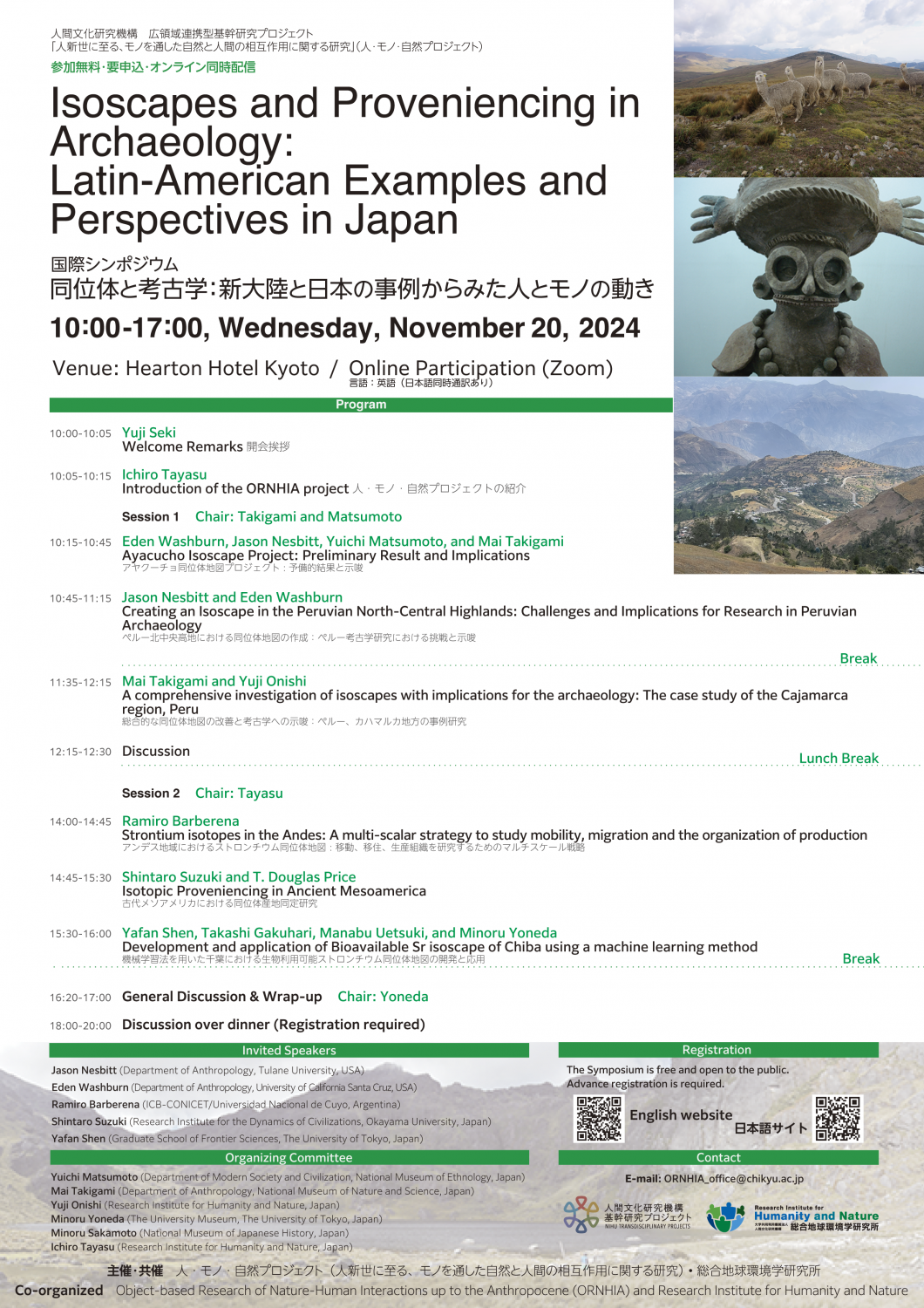- Other
Isoscapes and Proveniencing in Archaeology: Latin-American Examples and Perspectives in Japan
| Date | 10:00-17:00, Wednesday, November 20, 2024 |
|---|---|
| Venue | Hearton Hotel Kyoto (Two-minute walk from the Karasuma-Oike station, 405 Funaya-cho, Nakagyo-Ku, Kyoto-shi, Kyoto, 604-0836, Japan) |
| Registration | On-site or online participation (Zoom) Registration form: https://forms.gle/hDMAqQnVfW6S4THU6 Deadline: On-site: Friday 1 November, 17:00 Online: Monday 18 November, 17:00 |
| Abstract | Isotope analysis is a scientific tool that provides information about the origin of materials and the use of resources in nature. In recent years, isotopic maps (called Isoscapes), have been used to study the history of human migrations and to identify the provenance of artifacts. This international symposium will introduce research topics in Latin America, where this approach has been particularly well developed, and exchange information on what insights this method can provide for archaeological research. Finally, we would like to introduce research in Japan and discuss the prospects for the method in Japan. |
| Program | Registration 9:30-10:00 10:00-10:05 Yuji Seki Welcome Remarks 10:05-10:15 Ichiro Tayasu “Introduction of the ORNHIA project” Session 1 (Chair Takigami and Matsumoto) 10:15-10:45 Eden Washburn, Jason Nesbitt, Yuichi Matsumoto, and Mai Takigami “Ayacucho Isoscape Project: Preliminary Result and Implications” 10:45-11:15 Jason Nesbitt and Eden Washburn “Creating an Isoscape in the Peruvian North-Central Highlands: Challenges and Implications for Research in Peruvian Archaeology” Break 11:35-12:15 Mai Takigami and Yuji Onishi “A comprehensive investigation of isoscapes with implications for the archaeology: The case study of the Cajamarca region, Peru” 12:15-12:30 Discussion Group photos Lunch Break Session 2 (Chair Tayasu) 14:00-14:45 Ramiro Barberena “Strontium isotopes in the Andes: A multi-scalar strategy to study mobility, migration and the organization of production” 14:45-15:30 Shintaro Suzuki and T. Douglas Price “Isotopic Proveniencing in Ancient Mesoamerica” 15:30-16:00 Yafan Shen, Takashi Gakuhari, Manabu Uetsuki, and Minoru Yoneda “Development and application of Bioavailable Sr isoscape of Chiba using a machine learning method” Break 16:20-17:00 General Discussion & Wrap-up (Chair Yoneda) 18:00-20:00 Discussion over dinner (Registration required) |
| Language | English |
| Invited Speakers | Jason Nesbitt (Department of Anthropology, Tulane University, USA) Eden Washburn (Department of Anthropology, University of California Santa Cruz, USA) Ramiro Barberena (ICB-CONICET/Universidad Nacional de Cuyo, Argentina) Shintaro Suzuki (Research Institute for the Dynamics of Civilizations, Okayama University, Japan) Yafan Shen (Graduate School of Frontier Sciences, The University of Tokyo, Japan) |
| Organizing Committee | Yuichi Matsumoto (Department of Modern Society and Civilization, National Museum of Ethnology, Japan) Mai Takigami (Department of Anthropology, National Museum of Nature and Science, Japan) Yuji Onishi (Research Institute for Humanity and Nature, Japan) Minoru Yoneda (The University Museum, The University of Tokyo, Japan) Minoru Sakamoto (National Museum of Japanese History, Japan) Ichiro Tayasu (Research Institute for Humanity and Nature, Japan) |
| Co-organized | Object-based Research of Nature-Human Interactions up to the Anthropocene (ORNHIA) and Research Institute for Humanity and Nature |
| Contact | ORNHIA Project, RIHN E-mail. ORNHIA_office[at]chikyu.ac.jp *Please change [at] to @ |
